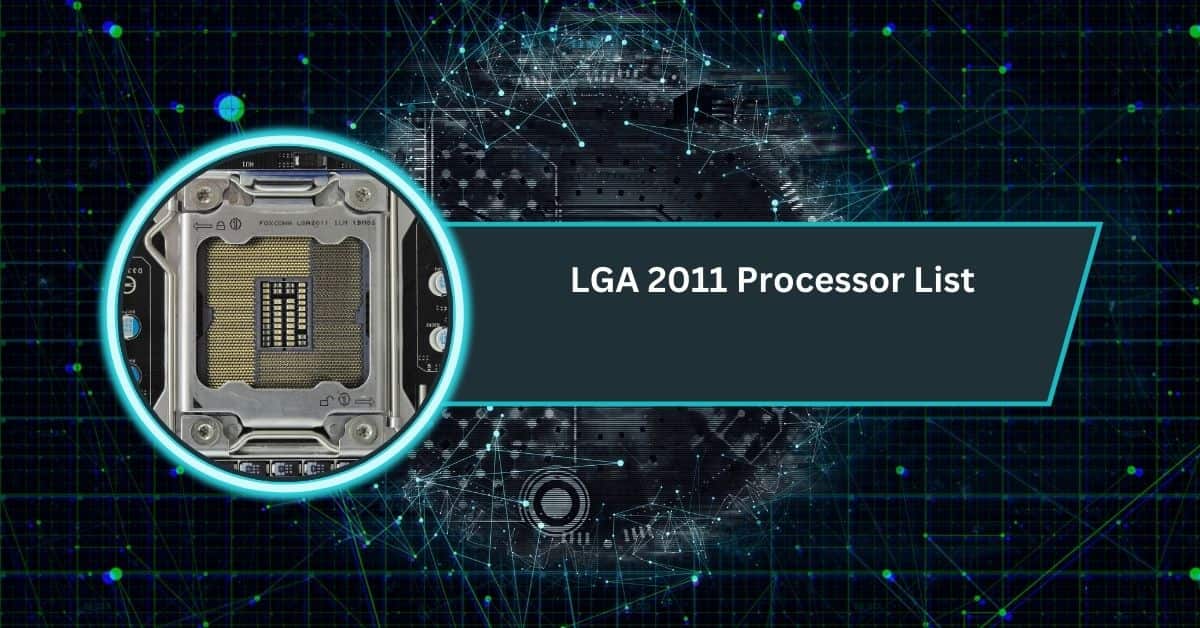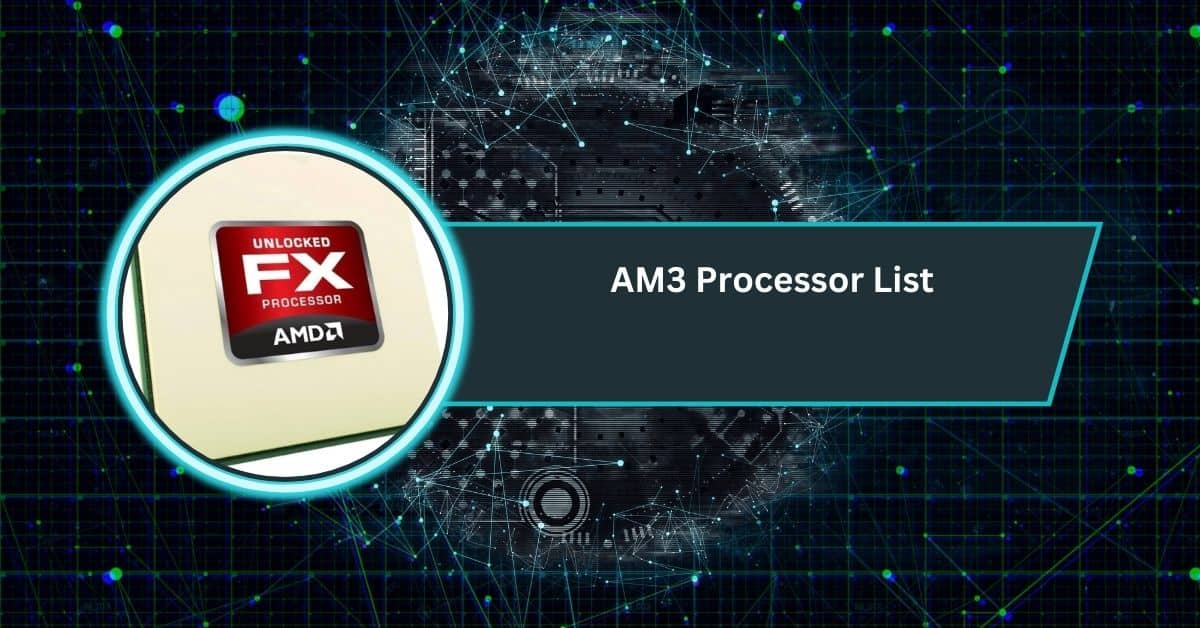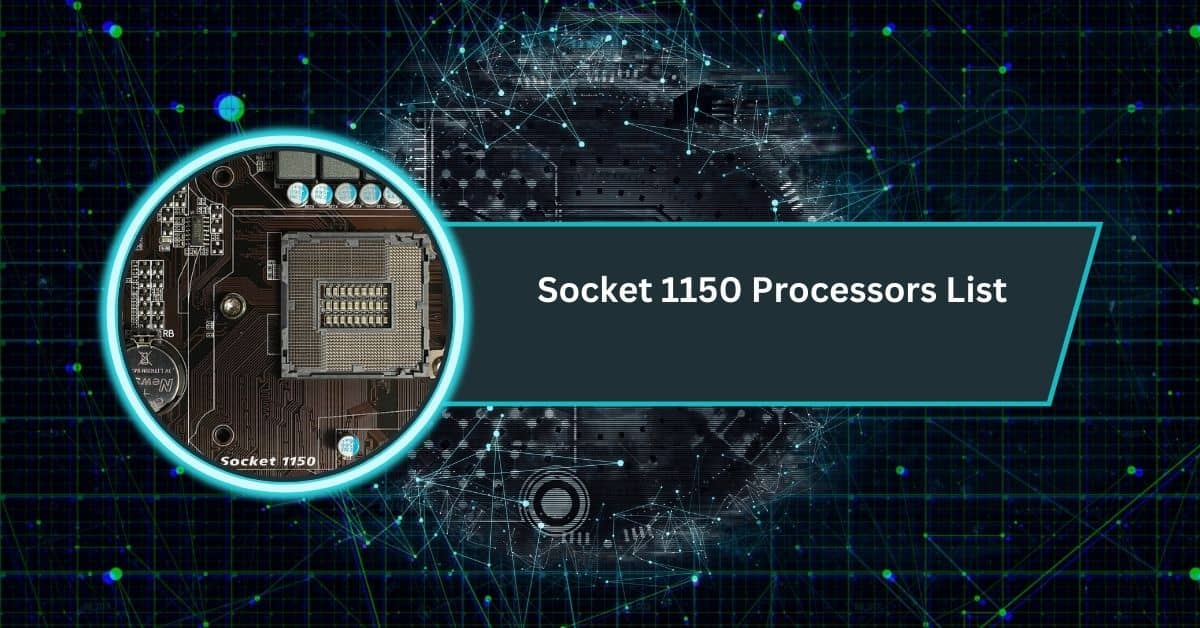Socket 1155, or LGA 1155, is an Intel processor socket introduced in 2011. It was designed to support the second and third-generation Intel Core processors, including Sandy Bridge and Ivy Bridge chips.
The Socket 1155 (LGA 1155) supports a range of Intel processors, including the i3, i5, i7, and Xeon series. Popular models like the i7-2600K and i5-2500K offer solid performance for gaming and productivity.
In this article, we’ll explore the best processors, motherboards, and gaming options for Socket 1155, offering insights into its capabilities and performance.
What is Socket LGA 1155?
LGA 1155 (land grid array, 1155 contact pads) — also marketed as Socket H2 — is a desktop CPU socket Intel introduced for its 2nd-generation Core (Sandy Bridge) family in 2011 and continued through the 3rd-generation Ivy Bridge family (2012–2013).
The socket physically supports processors with the LGA1155 package; compatibility depends on the processor generation and the motherboard/chipset/BIOS.
In short: same physical socket for two architectural generations (Sandy Bridge and Ivy Bridge), but BIOS/motherboard may limit which exact CPU revisions are supported.
Overview of Socket 1155 Processors
The processors compatible with Socket 1155 are divided into two main microarchitectures:
- Sandy Bridge (2nd Generation Intel Core): Manufactured using a 32nm process, these processors were released in early 2011. They introduced significant improvements in performance and power efficiency over their predecessors.
- Ivy Bridge (3rd Generation Intel Core): Built on a 22nm process, Ivy Bridge processors were launched in 2012. They offered enhanced performance, better power efficiency, and support for newer technologies compared to Sandy Bridge.
List of Socket 1155 Processors
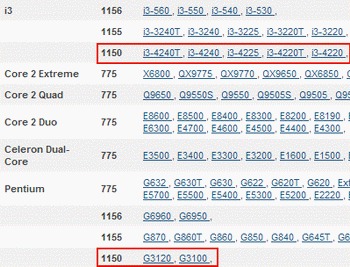
Below is a comprehensive list of Socket 1155 processors, categorized by their series and microarchitecture:
1. Intel Core i7 Series
- Sandy Bridge:
- i7-2600: 3.4 GHz, 8MB cache, 95W TDP
- i7-2600K: 3.4 GHz, 8MB cache, 95W TDP (unlocked multiplier)
- i7-2700K: 3.5 GHz, 8MB cache, 95W TDP (unlocked multiplier)
- i7-3770: 3.4 GHz, 8MB cache, 77W TDP
- i7-3770K: 3.5 GHz, 8MB cache, 77W TDP (unlocked multiplier)
- i7-3770S: 3.1 GHz, 8MB cache, 65W TDP
- i7-3770T: 2.5 GHz, 8MB cache, 45W TDP
- Ivy Bridge:
- i7-3770: 3.4 GHz, 8MB cache, 77W TDP
- i7-3770K: 3.5 GHz, 8MB cache, 77W TDP (unlocked multiplier)
- i7-3770S: 3.1 GHz, 8MB cache, 65W TDP
- i7-3770T: 2.5 GHz, 8MB cache, 45W TDP
2. Intel Core i5 Series
- Sandy Bridge:
- i5-2400: 3.1 GHz, 6MB cache, 95W TDP
- i5-2400S: 2.5 GHz, 6MB cache, 65W TDP
- i5-2500: 3.3 GHz, 6MB cache, 95W TDP
- i5-2500K: 3.3 GHz, 6MB cache, 95W TDP (unlocked multiplier)
- i5-2550K: 3.4 GHz, 6MB cache, 95W TDP (unlocked multiplier)
- i5-3570: 3.4 GHz, 6MB cache, 77W TDP
- i5-3570K: 3.4 GHz, 6MB cache, 77W TDP (unlocked multiplier)
- i5-3570S: 3.1 GHz, 6MB cache, 65W TDP
- i5-3570T: 2.3 GHz, 6MB cache, 45W TDP
- Ivy Bridge:
- i5-2400: 3.1 GHz, 6MB cache, 95W TDP
- i5-2400S: 2.5 GHz, 6MB cache, 65W TDP
- i5-2500: 3.3 GHz, 6MB cache, 95W TDP
- i5-2500K: 3.3 GHz, 6MB cache, 95W TDP (unlocked multiplier)
- i5-2550K: 3.4 GHz, 6MB cache, 95W TDP (unlocked multiplier)
- i5-3570: 3.4 GHz, 6MB cache, 77W TDP
- i5-3570K: 3.4 GHz, 6MB cache, 77W TDP (unlocked multiplier)
- i5-3570S: 3.1 GHz, 6MB cache, 65W TDP
- i5-3570T: 2.3 GHz, 6MB cache, 45W TDP
3. Intel Core i3 Series
- Sandy Bridge:
- i3-2100: 3.1 GHz, 3MB cache, 65W TDP
- i3-2105: 3.1 GHz, 3MB cache, 65W TDP
- i3-2120: 3.3 GHz, 3MB cache, 65W TDP
- i3-2125: 3.3 GHz, 3MB cache, 65W TDP
- i3-2130: 3.4 GHz, 3MB cache, 65W TDP
- Ivy Bridge:
- i3-3220: 3.3 GHz, 3MB cache, 55W TDP
- i3-3225: 3.3 GHz, 3MB cache, 55W TDP
- i3-3240: 3.4 GHz, 3MB cache, 55W TDP
Also Read: Do Intel K Processors Have Integrated Graphics: Must Read!
Processor Families Compatible with Socket 1155
The Socket 1155 platform supports a variety of Intel processor families, each targeting different market segments:
- Intel Core i7 Processors: High-performance CPUs designed for demanding applications like gaming, content creation, and professional workloads.
- Intel Core i5 Processors: Mid-range CPUs offering a balance between performance and cost, suitable for mainstream users and gamers.
- Intel Core i3 Processors: Entry-level CPUs ideal for everyday computing tasks such as web browsing, office applications, and media consumption.
- Intel Pentium Processors: Budget-friendly options for basic computing needs.
- Intel Celeron Processors: Low-cost processors for minimal computing tasks.
- Intel Xeon Processors: Server-grade CPUs designed for workstations and servers, offering features like ECC memory support.
Microarchitectures Supported by Socket 1155
Socket 1155 supports two main Intel microarchitectures:
- Sandy Bridge (2nd Generation Intel Core): This was the first series of processors released for Socket 1155. It brought major improvements over the previous generation, including better performance and power efficiency.
- Ivy Bridge (3rd Generation Intel Core): Ivy Bridge processors, released in 2012, are based on a smaller 22nm process node, resulting in lower power consumption and improved performance compared to the Sandy Bridge chips.
Popular Processor Series Under Socket 1155
- Intel Core i7 Series: These processors provide high-end performance with multiple cores and higher clock speeds, which is ideal for gamers, creators, and power users.
- Intel Core i5 Series: The i5 processors are mid-range options that offer great performance for general computing, gaming, and productivity without going into premium pricing.
- Intel Core i3 Series: Ideal for entry-level users, the i3 series delivers decent performance for casual computing tasks like web browsing, media consumption, and office productivity.
- Intel Pentium and Celeron Series: These are low-cost processors designed for budget-conscious users who require basic functionality such as web browsing, word processing, and light multitasking.
Socket 1155 Compatibility and Upgrades

Socket 1155 is compatible with Sandy Bridge and Ivy Bridge processors, but not all motherboards support both. When upgrading, checking if your motherboard supports the new processor’s microarchitecture is important.
You may need to update the motherboard’s BIOS for the new chip to work properly. Always confirm compatibility before upgrading for smooth performance.
Differences Between Sandy Bridge and Ivy Bridge Processors
While both Sandy Bridge and Ivy Bridge processors are supported by Socket 1155, there are several key differences between them:
- Manufacturing Process: Sandy Bridge chips are built on a 32nm process, while Ivy Bridge chips use a 22nm process, resulting in better power efficiency and thermal performance in the latter.
- Graphics Performance: Ivy Bridge processors come with improved integrated graphics, providing a better experience for users who rely on the integrated GPU for light gaming and multimedia tasks.
- Performance: Ivy Bridge processors generally have higher clock speeds and better overall performance per watt than Sandy Bridge, thanks to the architectural refinements.
Compatibility and Upgrading Tips
Before purchasing a Socket 1155 CPU, check your motherboard’s CPU support list, as some require BIOS updates for Ivy Bridge compatibility.
Popular motherboards like the ASUS P8Z77-V PRO and Gigabyte GA-H61M-DS2 support a wide range of LGA 1155 CPUs.
Ensure your power supply and cooling solution can handle higher TDP models like the i7-2600K (95W). For overclocking, choose “K” series CPUs and a Z77 chipset motherboard.
In the USA, refurbished LGA 1155 CPUs are available on Newegg, Amazon, and eBay, with prices ranging from $5 (Celeron) to $250 (i7-3770K). Always verify seller ratings and CPU condition to avoid DOA units.
Overclocking Potential with Socket 1155 Processors
Socket 1155 processors, especially the “K” series like the i5-2500K and i7-2600K, are great for overclocking. Overclocking boosts performance by increasing the processor’s speed.
With the right cooling system and motherboard, you can safely push these processors beyond their default limits, improving performance in gaming and rendering without needing to upgrade to newer hardware.
Gaming Performance with Socket 1155 Processors
Socket 1155 processors offer great gaming performance, particularly the i7 and i5 models. They have multiple cores, making them ideal for modern games that need fast processing.
While they may not compete with newer processors, they still provide excellent gaming performance when paired with a good graphics card. Players can enjoy smooth gameplay on many popular titles.
Best Motherboards for Socket 1155 Processors
For Socket 1155 processors, the best motherboards come with chipsets like Z68, Z77, and P67. These chipsets offer overclocking support, multiple PCIe slots, and good connectivity.
If you plan on overclocking, choose a motherboard with a Z-series chipset. P67 or H77 motherboards are excellent options for regular use, offering stability and solid performance for everyday tasks.
Choosing the Right Socket 1155 Processor for Your Needs
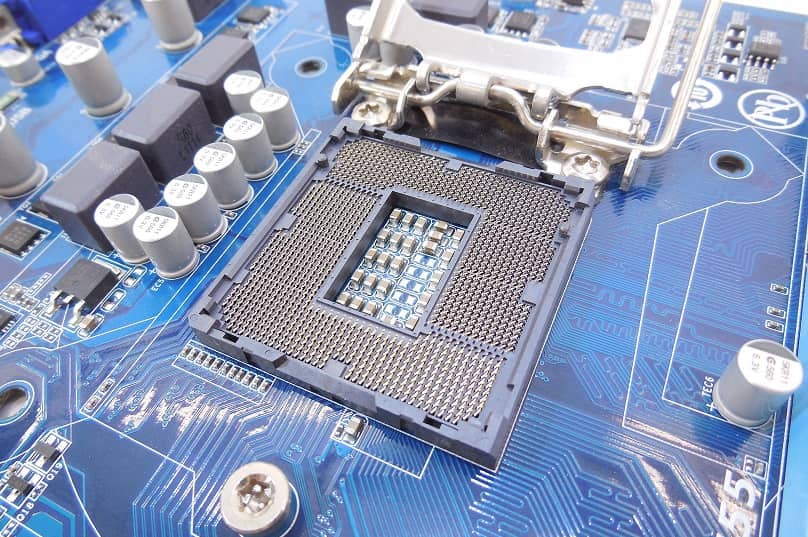
When selecting a Socket 1155 processor, consider the following:
- Performance Requirements: For users who need a balance of price and performance, an Intel Core i5 or i7 processor from the Sandy Bridge or Ivy Bridge series is a great choice. The Core i3 or Pentium and Celeron processors are viable options for budget-conscious users.
- Future-proofing: While Socket 1155 processors are no longer the latest and greatest, they still perform excellently for most tasks. However, if you plan on using demanding software or gaming at higher settings, consider upgrading to a newer socket such as LGA 1200.
- Power Efficiency: If you are building a system for low power consumption and quieter operation, opt for the processors with lower TDP, like the “T” series (e.g., i7-3770T).
Must Know: 2.5gz Processor Can Process How Many Megabites: Explore!
LGA 1155 Supported Processor Generation
LGA 1155 supports two main generations: Sandy Bridge and Ivy Bridge. Sandy Bridge was released in 2011, while Ivy Bridge followed in 2012. Both generations offer solid performance for everyday tasks and gaming.
List of Socket 1155 Processors for Gaming
The best Socket 1155 processors for gaming include the Intel Core i7-2600K, i7-2700K, i5-2500K, and i5-3570K. These processors offer high clock speeds and multiple cores, making them great for smooth gaming performance.
LGA 1155 Best CPU
The best CPU for LGA 1155 is the Intel Core i7-2600K. Its unlocked multiplier, high clock speed, and strong multi-core performance offer excellent gaming and multitasking performance, making it a top choice for enthusiasts.
LGA 1155 Motherboard
For LGA 1155, the best motherboards include chipsets like Z77, Z68, and P67. These motherboards offer overclocking support, multiple expansion slots, and strong overall performance, making them ideal for gaming and high-performance tasks.
LGA 1155 Processor i7
The Intel Core i7 processors for LGA 1155, like the i7-2600K and i7-3770K, are high-performance chips ideal for gaming, content creation, and multitasking. They feature multiple cores, high speeds, and strong overclocking potential.
LGA 1155 CPU List for Gaming
The best LGA 1155 CPUs for gaming are the i7-2600K, i5-2500K, i5-3570K, and i7-3770K. These processors are great for running modern games smoothly, providing good clock speeds and multi-core support for demanding titles.
LGA 1155 Socket
LGA 1155, also called Socket H2, is an Intel socket that supports processors like the Sandy Bridge and Ivy Bridge chips. It performs well for casual users and gamers and has strong multitasking capabilities.
FAQs
1. Which CPUs use socket 1155?
Socket 1155 supports Intel processors from the Sandy Bridge and Ivy Bridge generations, including i3, i5, i7, and Xeon.
2. Is LGA 1155 outdated?
Yes, LGA 1155 is outdated, replaced by newer sockets like LGA 1151 and LGA 1200 for modern processors.
3. What generation is socket 1155?
Socket 1155 supports the 2nd (Sandy Bridge) and 3rd (Ivy Bridge) generation Intel Core processors.
4. Is FCLGA1155 the same as LGA 1155?
Yes, FCLGA1155 is another name for LGA 1155. Both refer to the same Intel processor socket.
5. What is the most powerful socket 1155 CPU?
The most powerful Socket 1155 CPU is the Intel Core i7-3770K, offering high speeds and great multitasking performance.
6. Best LGA-1155 CPU?
The i7-3770K is the best LGA-1155 CPU, offering strong performance, overclocking potential, and reliable multitasking even today.
7. What is the best CPU for Socket 1155?
The Intel Core i7-3770K is widely considered the best for Socket 1155, thanks to its excellent gaming and productivity performance.
8. How old is socket 1155?
Socket 1155 was introduced in 2011, making it more than a decade old, yet still used in some budget systems today.
9. Is LGA 1155 better than 1150?
LGA 1150 is newer and usually faster, but LGA 1155 still offers good value with affordable CPUs and older motherboard support.
10. What socket is the i7-3770K?
The Intel Core i7-3770K uses the LGA 1155 socket, making it compatible with 2nd and 3rd generation Intel motherboards.
Conclusion
In conclusion, Socket 1155 processors, including the Intel Core i3, i5, and i7 models, offer solid performance for gaming and everyday tasks. While outdated, they remain viable for budget-conscious users seeking reliable performance without upgrading to newer hardware.









